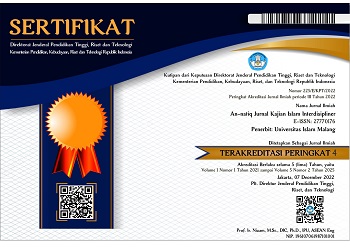HAK WARIS MAFQUD (ORANG HILANG) DAN PENYELESAIAN DENGAN METODE MAUQUF (PENANGGUHAN)
DOI:
https://doi.org/10.33474/an-natiq.v4i1.21409Abstract
In principle, Islamic inheritance law has provided very clear signs related to the determination of heirs and the share received by each heir. However, in the reality of life, there are heirs whose whereabouts and communication with their families are unknown for a very long period of time (mafqud), and in this case the scholars of the madhhab also provide a relatively very long waiting period, so that it becomes a problem in the future when there is a heir who dies and there are heirs who want the inheritance to be distributed immediately without waiting for clarity on the status of one or several other missing heirs (mafqud). This research aims to provide the best solution to the distribution of inheritance that has mafqud heirs in it by using the mauquf method, so as not to cause conflict in the midst of the family. This research uses descriptive analytical method with qualitative approach. Describing the concept of mafqud inheritance, the opinions of the mazhab scholars and the method of calculating the share comprehensively. The results of this study using the mauquf method, all heirs can know their respective shares and the property can be distributed in the time they want, by means of if the missing heir (mafqud) is one person estimated with two conditions, namely still alive and dead. If there are two or more missing heirs, then the problem increases according to the number of missing persons and their circumstances, so that in the case of two missing persons, there are four circumstances. Other heirs can only take the smallest share first if in these circumstances they get a share, otherwise the share is mauqufkan (suspended) until the clarity of the mafqud is known either in reality or hukmi (decided in the religious court by the judge).
References
Al-‘Imrani, Abu Hasan Yahya bin Abi al-Khair Salim. 1421. Al-Bayan Fi Mazhab Al-Syafi’i, Jilid IX. Beirut: Dar al-Minhaj.
Al-Bahuti, Masur bin Yusuf. 1403. Kasyaf Al-Qina’, Jilid IV. Beirut: Dar ‘Alim al-Kutub.
Al-Hanbali, Ibnu Qudamah. 1410. Al-Mughni, Jilid IX. Kairo: Dar al-Hijr.
Al-Ifriqi, Ibnu Manzur. 1419. Lisan Al-‘Arab, Jilid X. Beirut: Dar al-Ihya’ al-Turas al-Islami.
Al-Jarjani, ‘Ali bin Muhammad. 1413. Al-Ta’rifat. Beirut: Dar al-Kitab al’Arabi,.
Al-Maliki, Jalal al-Din ‘Abdullah bin Najmu bin Syas. 1415. ‘Aqd Al-Jawahir Al-Saminah, Jilid III. Beirut: Dar al-Gharbi al-Islami.
Al-Syarbaini, Syamsuddin Muhammad Khaṭib. 1415. Mughni Al-Muhtaj, Jilid IV. Beirut: Dar al-Kutub al-‘Ilmiyah.
Al-Turmuzi. n.d. Al-Da’wat, Hadis No. 3550. Bab 102.
Al-Turmuzi, Abu ‘Isa Muhammad bin ‘isa. n.d. Al-Jami’ Al-Sahih, Jilid V. Beirut: Dar al-Kutub al-‘Ilmiyyah.
Amin, Muhammad. 1386. Raddu Al-Muhtar ‘ala Al-Durri Al-Mukhtar, Jilid IV. Beirut: Dar al-Fikr.
Anshori, Abdul Ghofur. 2005. Hukum Kewarisan Islam Di Indonesia Eksistensi Dan Adaptabilitas. Yogyakarta: Ekonisia.
Moleong, Lexy. J. 2001. Metodologi Penelitian Kualitatif, Cet. Ke 14. Bandung: Remaja Rusda Karya.
Muhibbussabry. 2020. Fikih Mawaris. Medan: Pusdikra Mitra Jaya.
Nasution, Amin Husein.2014. Hukum Kewarisan: Suatu Analisis Komparatif Pemikiran Mujtahid Dan Kompilasi Hukum Islam. Jakarta: Raja Grafindo Persada.
Syarifuddin, Amir. 2005. Hukum Kewarisan Islam. Jakarta: Kencana.
Downloads
Published
How to Cite
Issue
Section
License
Copyright (c) 2023 An-natiq Jurnal Kajian Islam Interdisipliner

This work is licensed under a Creative Commons Attribution-NonCommercial-ShareAlike 4.0 International License.


























